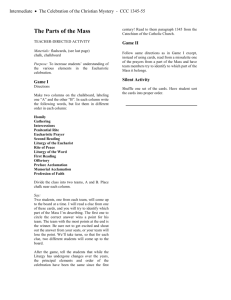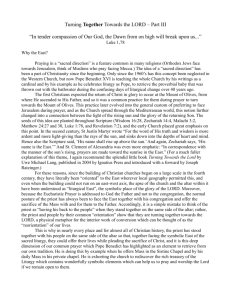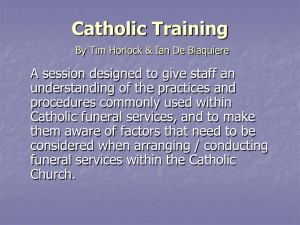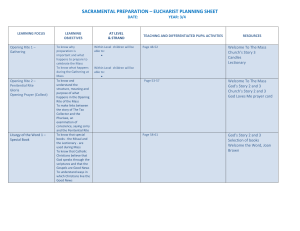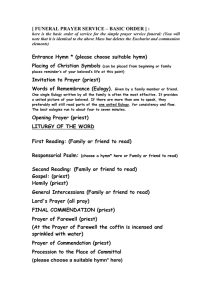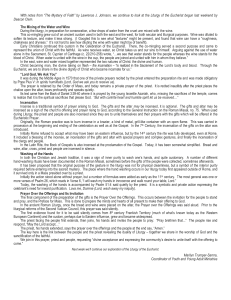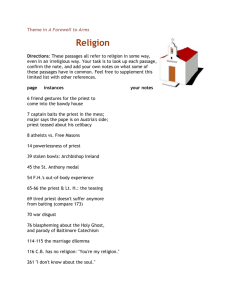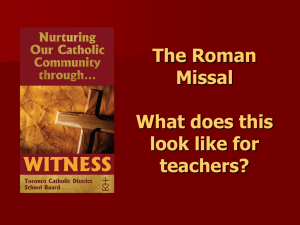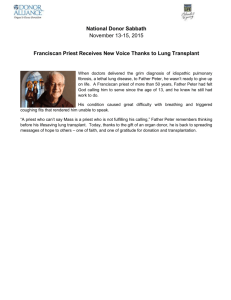Discussion Questions - St. Francis of Assisi Catholic Church
advertisement
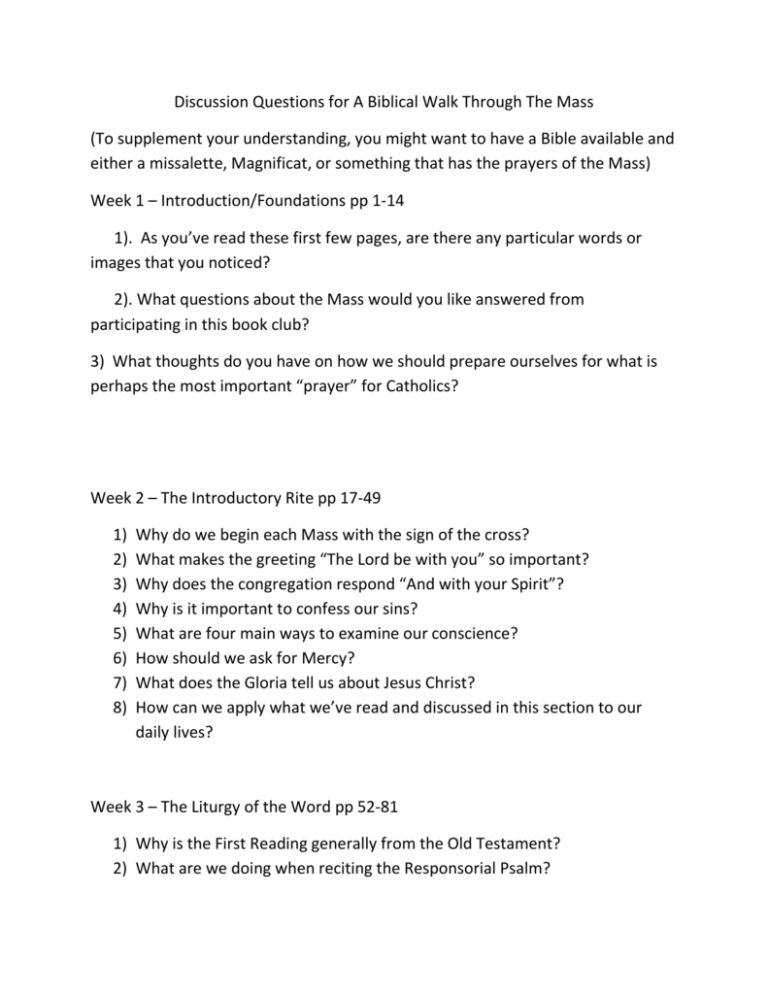
Discussion Questions for A Biblical Walk Through The Mass (To supplement your understanding, you might want to have a Bible available and either a missalette, Magnificat, or something that has the prayers of the Mass) Week 1 – Introduction/Foundations pp 1-14 1). As you’ve read these first few pages, are there any particular words or images that you noticed? 2). What questions about the Mass would you like answered from participating in this book club? 3) What thoughts do you have on how we should prepare ourselves for what is perhaps the most important “prayer” for Catholics? Week 2 – The Introductory Rite pp 17-49 1) 2) 3) 4) 5) 6) 7) 8) Why do we begin each Mass with the sign of the cross? What makes the greeting “The Lord be with you” so important? Why does the congregation respond “And with your Spirit”? Why is it important to confess our sins? What are four main ways to examine our conscience? How should we ask for Mercy? What does the Gloria tell us about Jesus Christ? How can we apply what we’ve read and discussed in this section to our daily lives? Week 3 – The Liturgy of the Word pp 52-81 1) Why is the First Reading generally from the Old Testament? 2) What are we doing when reciting the Responsorial Psalm? 3) When do we generally have a second reading and what is the purpose? 4) Why do participants make a three-fold sign of the cross at the beginning of the Gospel? 5) Why is the Gospel such a sacred part of the Mass? 6) What is the purpose of the Homily? 7) How is the Creed similar to the Old Testament Shema? 8) In the Creed, on pages 73-74, in what ways do we find the Christian view of the world different from the way modern men and women view and live their lives? 9) In the Prayers of the Faithful, we have intercessory prayers. What one intention would you like to pray for today? Think about the intentions you will pray for the next time you attend Mass. Week 4 – The Liturgy of the Eucharist (Preparation of the Gifts and Eucharistic Prayer –The Preface, The Sanctus and the Epiclesis) pp 85-106 1) 2) 3) 4) 5) 6) What does the Priest do in the Preparation of the Gifts? How would you describe the Presentation of the Gifts to a non-Catholic? Why does the priest pour a drop of water into the wine? What do you think is the significance of the priest washing his hands? What else caught your attention as you read pages 85-92? At the start of the Eucharist Prayer, the priest says “The Lord be with you”. Where else have you heard this greeting? (two different places). What do those words mean? 7) Then he says “Lift up your hearts”. Why is it important to do so? 8) Then, we hear the priest say “Let us give thanks to the Lord our God”. Why is it important to respond “it is right and just” to give thanks? 9) What makes the Sanctus such an overwhelming prayer? 10) Why does the priest pray the Epiclesis? Week 5 – The Liturgy of the Eucharist (Eucharistic Prayer- The Words of Institution and Consecration, The Mystery of Faith, and the Final Doxology) pp107-121 1) According to Jesus’ words at the Last Supper, what does Jesus intend to be offered up and poured out in sacrifice? What does that mean and why is it relevant? 2) Thinking a about the Last Supper and this sacrificial offering of Jesus on the cross, what does that mean for us? 3) What did you find in the meaning of “anamnesis”? How can we apply that in our daily lives? 4) How has the Mystery of Faith increased you understanding of these words? 5) Who is mentioned as three models of sacrifice? Why should these also be models for us? 6) The Eucharistic Prayer concludes with the “Great Amen”. How has this section increased your understanding of what that means? Week 6 – The Communion Rite (The Lord’s Prayer; The Rite of Peace;, Angus Dei: The Fraction, Commingling, and the “Lamb of God”; Holy Communion); The Concluding Rites (Greeting, Blessing, Dismassal) pp122-148 1) 2) 3) 4) 5) 6) 7) What is so “daring” about saying the Our Father? What else did you learn about the Our Father? How does the sign of peace fit into the liturgy? Why does the priest break the host in what is known as “the fraction”? How did the rite of commingling come into the celebration of the Mass? What’s the significance of calling Jesus “the Lamb of God”? What thoughts do you have about Pope St. John Paul II’s comments regarding Mary and the Eucharist? 8) What are we called to do at the end of Mass?
